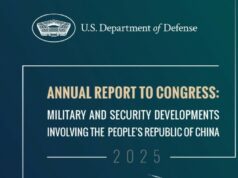Steven Clemons is the Editor-at-Large at National Interest and Co-Chair of the GLOBSEC US Initiative. In a brief chat with StratnewsGlobal on the sidelines of the 10th Raisina Dialogue in New Delhi, he shared candid insights on the evolving transatlantic security landscape under Donald Trump’s presidency.
Acknowledging the strain Trump’s policies have placed on the traditional US-European alliance, particularly in the context of NATO, he noted that Trump’s America-first approach has reshaped the security equation, forcing Europe to rethink its dependence on the US.
While NATO was once a pillar of American security interests, Trump has framed it as a European responsibility, leading to instability in the alliance. Though cooperation will continue, Clemons predicts a significant decline in the robustness of the relationship.
The shift has broader implications, especially in how nations perceive strategic autonomy. Clemons observed that Trump admires India’s ability to maintain independent security policies, a trait he hopes Europe will adopt. However, this push toward self-reliance has exposed the financial burden of defence spending for European nations, which previously relied on American military backing while prioritising social welfare.
On a broader geopolitical scale, Clemons dismissed the idea of a Trump-Putin-Xi alliance, arguing that Russia lacks the economic clout to be a true global power. Instead, he emphasised that China and India are the most significant rising forces. With the US pulling back from global commitments, China’s Belt and Road Initiative has gained traction, while India’s role in global affairs is set to expand.
Despite Trump’s often unpredictable diplomacy, Clemons pointed out that many world leaders, including those in Africa and Southeast Asia, appreciate his transactional style. His direct approach provides clarity in negotiations, even if it disrupts traditional alliances.
However, this unpredictability poses challenges for countries historically reliant on US security guarantees, such as Japan and NATO allies, who must now renegotiate their positions.
For India, Trump’s policies present both challenges and opportunities. While trade relations face hurdles, particularly in the movement of skilled talent, the overall geopolitical relationship between India and the US remains on stable ground. Clemons believes India is better positioned to navigate the Trump era than many traditional allies, given its self-sufficient strategic outlook.
As global alliances undergo rapid transformation, Clemons anticipates a more chaotic, ad-hoc world order. While Trump’s policies may weaken long-standing partnerships, they also force a necessary re-evaluation of security structures, potentially leading to more balanced global power dynamics in the long run. The road ahead, however, promises to be anything but smooth.
In a career spanning three decades and counting, Ramananda (Ram to his friends) has been the foreign editor of The Telegraph, Outlook Magazine and the New Indian Express. He helped set up rediff.com’s editorial operations in San Jose and New York, helmed sify.com, and was the founder editor of India.com.
His work has featured in national and international publications like the Al Jazeera Centre for Studies, Global Times and Ashahi Shimbun. But his one constant over all these years, he says, has been the attempt to understand rising India’s place in the world.
He can rustle up a mean salad, his oil-less pepper chicken is to die for, and all it takes is some beer and rhythm and blues to rock his soul.
Talk to him about foreign and strategic affairs, media, South Asia, China, and of course India.




